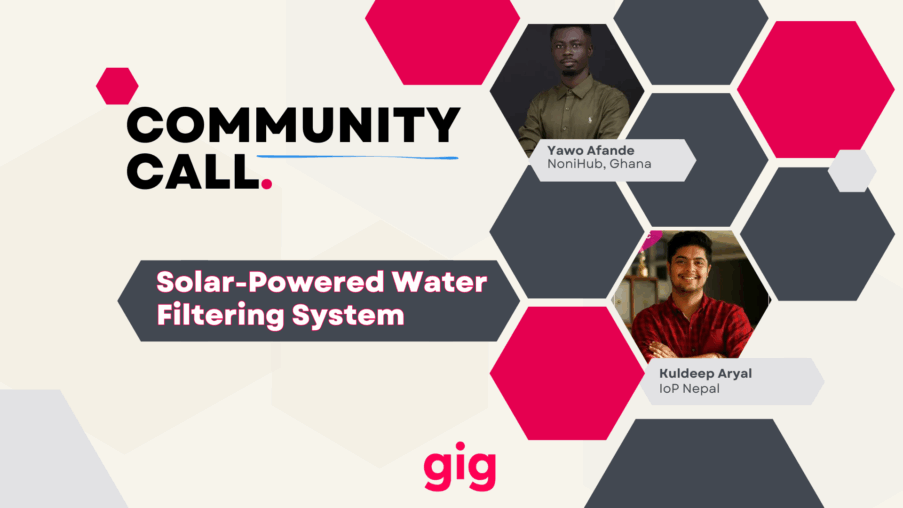The latest Global Innovation Gathering (GIG) Community Call brought together members of the network to discuss an open-source project that directly addresses water access challenges in rural and coastal regions. The project centres on a portable, solar-powered reverse osmosis (RO) system with a seven-stage filtration design. Developed through collaboration and knowledge exchange, the system is tailored to provide safe drinking water in communities where contamination and salinity remain pressing issues.
The session highlighted the unique way GIG members inspire each other’s work. Kuldeep Aryal’s work in Nepal informed the efforts of Mustapha Dauda in Ghana, demonstrating how solutions can travel and evolve across different contexts. This exchange underscored the importance of community-driven innovation and how shared experimentation leads to grounded solutions.
One of the challenges discussed during the call was the cost and complexity of RO filters. Bilal Ghalib raised questions about replacement needs and alternatives to RO when removing salinity. These reflections sparked discussion about affordability and maintenance, which are central to ensuring the system can be sustained by the communities that adopt it.
Knowledge management and documentation were also recurring themes. Offray Luna emphasised the need for effective practices to capture and share the project’s memory, suggesting approaches like wikis and modular documentation to make the information more accessible and adaptable. This aligns with GIG’s broader interest in building infrastructures that support collective learning and open exchange.

Participants shared multiple resources during the call, including the LibreWater Acraea prototype repository and documentation from Libre Solar. These references point to a growing ecosystem of open hardware initiatives that communities can adapt and localise. The conversation also explored how derivative forks and localisation through platforms like Appropedia can support context-specific adaptation.
Michel added a perspective on the role of solar technology in regions like Iraq and Lebanon. He noted that the low perception of solar energy often stems from poor-quality hardware and systems lacking basic protections. By advancing open-source solar hardware with robust design, communities can rebuild trust and demonstrate the long-term viability of these solutions.
The project’s impact in Ghana highlights how it responds to two distinct but related challenges. In northern rural areas, communities face contamination in wells and open dams. In coastal schools near Accra, the problem is saline water. The system addresses both contexts by delivering clean water through solar-powered RO, creating a replicable model that can be shared across regions.
During the call, participants emphasised the importance of replication and adaptation. Shaukatali, for instance, expressed interest in rebuilding the system locally and sharing experiences of substituting parts that may not be available. Such contributions point to the collaborative ethos that defines GIG: the focus is not on replicating solutions exactly, but on adapting them to fit the realities of local environments.
The prototype, with a cost of around $1,700, represents a step toward making decentralised water purification more accessible. By balancing affordability, sustainability, and technical reliability, the project provides a practical response to water challenges that disproportionately affect vulnerable communities.

The Community Call closed with the recognition of the power of shared knowledge, underscoring that open hardware projects are not only about building devices but also about cultivating systems of care, collaboration, and documentation. As this work continues to spread across the GIG network, it reinforces the idea that innovation thrives when it is open, distributed, and shared.


